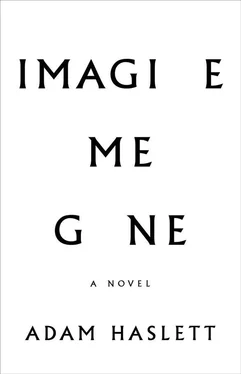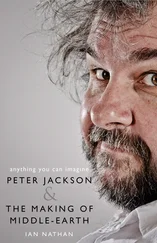A few weeks ago, the first night that I ate with Margaret and the children again, Celia kept scrunching her napkin on the table beside her, clenching and unclenching. When I told her to put it on her lap, she shouted at me that she would do what she wanted. Margaret slammed her utensils down and said if we didn’t stop it she would leave the table. But the next night was a little better. Michael wasn’t there to distract his brother and sister with laughter, but still, it was better.
Being up and about again, I started taking these walks. I wake early and bring Kelsey, who runs off the leash once we reach the woods. The cool oxygen of the plants and trees before the sun has dried them feels like a balm to my lungs. I’ve always preferred the woods in America to the woods where I grew up in Hampshire, which I can never help knowing are the hemmed-in exception to towns and villages and farms. New England is the other way around: a series of clearings in a forest. Keep walking north, and the clearings will shrink, until there are none. I don’t meet other people here, and that’s what matters. My mind can rest. Which is when my situation becomes obvious. There is no getting better. There is love I cannot bear, which has kept me from drifting entirely loose. There are the medicines I can take that flood my mind without discrimination, slowing the monster, moving the struggle underwater, where I then must live in the murk. But there is no killing the beast. Since I was a young man, it has hunted me. And it will hunt me until I am dead. The older I become, the closer it gets.
It’s midmorning by the time I cross back over the river and follow the path into the field at the end of our street, which is saturated now in the July heat. The grass is intensely green, the scrub-apple trees by the road past blooming, on into their pure summer verdancy, along with the rhododendron and the lilac, their flowers gone, their leaves fat with sun. The air smells of the fecund soil — the flesh covering the skull of the planet, the muck from which the plants rise, busy in the mindless life of heat. Celia and Alec were drugged with sleep when I left the house, as they always are, and I didn’t want to wake them. In summer, I can’t be sure of their whereabouts, but last night at dinner I paid attention, and got a sense of where they would be today.
Turning before I reach the house, I carry on into the center of the town. It’s quiet. Kids are away at camp or on holiday. The shops have bins and tables of merchandise out on the sidewalk and signs announcing sales. A few skateboarders sit glumly on the bench under the awning of the ice cream store watching the cars move slowly past. Across the street a woman smiles at me and waves enthusiastically and I nod and wave back, though I have no idea who she is. A mother of one of the children’s friends, in all likelihood, someone I’ve met at the school or in a driveway picking up Alec or Celia. I look away and keep walking lest she cross the street and begin speaking to me. In another time, I would have hooked into the aggression of her good cheer and doubled it up until running into her became an event with a momentum of its own. I’ve lived vicariously at times off that birthright of the American upper-middle class — their competitive optimism. It’s what I loved about working in this country. What are your plans? How’s the project? How’s business? When I left university in Britain, we didn’t have entrepreneurs. We had managers and industrial relations. Meeting someone at a party led to the circumlocutions designed to tease out where you’d been at school, one’s accent having made one acceptable company in the first place. In America, I flew all over the country talking to people about their wildest ambitions and they were always delighted to see me, even if I could promise them nothing. Calling them back a year or two later, after my partners and I had raised a fund, and telling them I wanted to help them create what they’d been dreaming of was a heady feeling. But that was a lifetime ago.
Back then, in Samoset, we rented a house for three hundred dollars a month. We had a secondhand station wagon, a vegetable garden, enough money that Margaret could stay home. Alec used to gallop up the street to meet me as I was walking back from the bus. He’d take my briefcase and carry it with him across the front lawn and around the house, where Michael and Celia would be playing in the tree fort or in the barn, and they’d come rushing over to push through the back door ahead of me, calling out to their mother that I was home. In the summer, we’d eat outside on a picnic table left by the previous tenants. I’d moved the table over toward the edge of the woods, onto a mossy square of concrete, and from there you looked back across the circular dirt drive to our octagonal house, white clapboard with a black roof and brick chimney. Margaret’s great-great-grandfather had been a carpenter in the town, and it turned out he was the one who had built the place for a Methodist minister. There had been an enthusiasm for the design among members of the Spiritualist movement. Having no right angles, the octagon was said to leave no corners in which evil spirits might become trapped. In the evening, with the windows illuminated, it resembled a squat lighthouse sending its warning in all directions. When the children were full and drowsy and had ceased their play I’d sometimes pretend with them that the house was haunted and tell them stories about the people who had gathered there a hundred years ago to speak with the dead by candlelight. Michael didn’t want to listen, pretending he was too old for ghost stories. Margaret would say, You’ll frighten them before bed, but Alec and Celia would squeal to me, No, no, keep going. I told them how the neighbors would come and join hands in the dark listening for the voices of their departed relatives, who would appear in our very living room and speak of the life of the dead. Alec clung to my side, Celia became very fixed and still, peering into the trees behind us, long after Margaret had cleared the table and Michael had gone off to his room, the three of us there together under the full-laden branches of the oak, surrounded by the hum of crickets. I sensed their tremendous need for me in those moments — for my voice to go on, to carry and protect them from everything that encircled us. And I did protect them. I told them they were safe because their mother’s ancestor had built our house so that no ghosts would ever stay, that all the frightening things that might ever have happened were long in the past and couldn’t possibly reach them now. Then I’d put Alec over my shoulder and take Celia’s hand and walk them into the house and up to their beds.
Walking past the cemetery of the Congregational church, I cross the street into the grocery-store parking lot. It’s barely half full and baking hot. Through the glass door at the rear of the building, I can see the row of three cash registers. And there’s Alec, leaning against the steel rim of one of the narrow black conveyor belts, talking to Doreen, a heavy smoker in her late sixties with a dyed-red bouffant and heavy jowls. Whenever I come into the store she tells me how much everyone loves Alec and she herself is clearly charmed by him, by how polite he is and how well he listens. He has a slightly precious manner for a fourteen-year-old, almost courtly. He asked me last year if he should take metalwork or theater, and I told him he’d meet more interesting people in the theater class. Which may be part of the reason for how he holds himself now, I suppose — the acting he’s been doing. But his formality he gets from his idea of me. He’s the only one born in America, the only one of the three who was excited when we told them we’d be moving to England.
I’ve never watched a child of mine strain to be an adult before. Michael and Celia have done it in private, away from my view, though their mother says I’m the one locked away from them, and I suppose I can’t deny that. But here is Alec now with his chin ever so slightly raised, nodding with judicial solemnity at whatever Doreen is pattering on about, while one foot taps rapidly on the linoleum floor and he holds his hands down at his waist, picking discreetly at his cuticles, his attention fixed on her. Something she says causes his eyes to widen in surprise, and he shakes his head, feigning indignation. And then his hands are out at his sides, he’s leaning forward, gesticulating with great vigor, and Doreen rolls her head back, laughing. Alec smiles, delighted by what he’s just said and the response it’s getting. The young actor with the audience of one. I find it almost repulsive. The overweeningness of it. Is this what I have bequeathed him? Doreen turns back to her register, and starts passing a woman’s groceries down the belt for Alec to bag.
Читать дальше












